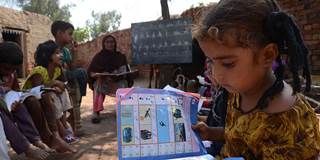The development debate in Pakistan has moved on considerably in the past 30 years, and local communities are playing an increasingly important role. Their involvement should be welcomed and encouraged, because it is vital for ensuring the acceptability and sustainability of development initiatives.
ISLAMABAD – In October 2018, Pakistani television news channels reported on how the local authorities in Pishin, a district in Balochistan province, were building a small dam to cope with frequent droughts in the area. Instead of accepting the government’s proposal to build the dam at a cost of PKR10 million ($71,000), the local community decided to build one itself for just PKR2.1 million under a European Union-funded rural-development program.
This self-sufficient approach to development has paid dividends elsewhere in Pakistan as well. The Hunza district in the country’s far north has a literacy rate of 95% – the highest in Pakistan – thanks to successful community-led schools, which outnumber low-quality government schools. And, emulating the Orangi Pilot Project on the outskirts of Karachi, the community built a sewage system with technical assistance from an NGO and financed 70% of the total cost.
These are not isolated examples. Frustrated with poor or non-existent state government services, local communities across Pakistan are playing a bigger role in development projects. Such community engagement, if widely replicated, could reduce the burden on state finances and enable the country to develop in a more inclusive and sustainable way.

ISLAMABAD – In October 2018, Pakistani television news channels reported on how the local authorities in Pishin, a district in Balochistan province, were building a small dam to cope with frequent droughts in the area. Instead of accepting the government’s proposal to build the dam at a cost of PKR10 million ($71,000), the local community decided to build one itself for just PKR2.1 million under a European Union-funded rural-development program.
This self-sufficient approach to development has paid dividends elsewhere in Pakistan as well. The Hunza district in the country’s far north has a literacy rate of 95% – the highest in Pakistan – thanks to successful community-led schools, which outnumber low-quality government schools. And, emulating the Orangi Pilot Project on the outskirts of Karachi, the community built a sewage system with technical assistance from an NGO and financed 70% of the total cost.
These are not isolated examples. Frustrated with poor or non-existent state government services, local communities across Pakistan are playing a bigger role in development projects. Such community engagement, if widely replicated, could reduce the burden on state finances and enable the country to develop in a more inclusive and sustainable way.